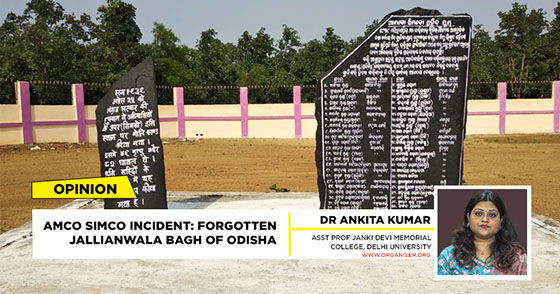The history of colonial India is replete with countless stories of resistance and struggle against British rule. While some events have gained widespread recognition and become integral to India’s narrative of Independence, there are several lesser-known incidents that remain buried in the annals of history. One such forgotten tale is the Amco Simco incident, which took place on April 25, 1939, in the Janjati heartland of Odisha. This incident, often referred to as the “Jallianwala Bagh of Odisha,” saw the valiant efforts of Janjatis, led by Nirmal Munda, against the unjust land tax and rent imposed by the British colonists. This piece delves into the details of the Amco Simco incident, its historical significance, and the need to remember and honour the sacrifices made by these brave Janjatis.
Resistance Against British Oppression
In the late 1930s, the Janjati communities of Odisha were facing severe exploitation and oppression under British rule. The colonial administration levied exorbitant land taxes and rents, leading to widespread discontent among the Janjati populace. Nirmal Munda emerged as a leader who rallied his fellow Janjatis against these injustices. The demand was clear – 36 villages were to be exempted from taxes, a demand rooted in the aspirations of these marginalised communities for economic and social justice.
The Struggle and Tragedy Unfold
On April 23, 1939, the Janjati communities gathered at Amco Simco, a village in the Raiboga Police Station area of Sundergarh district, to hear the verdict of their demands. This gathering attracted the attention of both the local British authorities and Nirmal Munda’s followers. Among the key figures present were Rani Janaki Ratna, political agent of Gangpur, and other British officers. Tensions escalated when the British authorities began searching for Nirmal Munda. The tragic events that unfolded were a grim reminder of the brutal colonial rule that valued the interests of the colonisers over the rights and lives of the colonised.
This tragic event is a testament to the indomitable spirit of the Janjati communities of Odisha who dared to stand up against the oppressive British rule. Such sacrifices need to be documented and shared
Amidst the confusion and fear, a confrontation between the British authorities and the Janjatis ensued. A boy who protested the entry of authorities into Nirmal Munda’s house was shot dead on the spot. This tragic event triggered a chain reaction, leading to brutal indiscriminate firing on the unarmed Janjatis. The result was the loss of 49 lives, although unofficial accounts suggest the toll might have been higher. More than 90 individuals were left injured, marking one of the darkest chapters of British colonial oppression in India.
Historical Significance and Legacy
The Amco Simco incident bears striking similarities to the infamous Jallianwala Bagh massacre, which occurred in 1919 in Amritsar. Just as General Dyer ordered his troops to open fire on a peaceful gathering of Indians, the British officers at Amco Simco chose to use brutal force against unarmed Janjatis who were merely demanding their rights. Despite its historical significance, the incident has remained largely unacknowledged in mainstream historical narratives. The reluctance to recognise the Amco Simco incident as a pivotal moment in India’s fight for Independence underscores the complexities of remembering the struggles of marginalised communities. It to recognise and memorialise the sacrifices made by the Janjatis in Amco Simco, in 2018, the area was developed as a tourism spot, and memorial pillars were erected to honour the martyrs. The names of those who lost their lives were inscribed on these pillars, ensuring that their sacrifices would not be forgotten.
Impact of Amco Simco on Modern India
The story of Amco Simco serves as a stark reminder of the struggles and sacrifices made by India’s Janjati communities in their fight against exploitation and oppression. The demands for land rights and tax exemptions were not merely economic concerns but were deeply intertwined with the broader aspirations of these communities for autonomy, dignity, and justice.
Despite efforts to memorialise the Amco Simco incident, challenges remain in ensuring that this history is recognised and acknowledged at a broader level. The struggle of Janjati communities against colonial rule often remains marginalised in historical accounts due to a lack of documentation, limited access to education and prevailing biases. This underscores the importance of addressing these challenges through inclusive education and research that sheds light on lesser-known incidents.
The Amco Simco incident stands as a testament to the indomitable spirit of the Janjati communities of Odisha who dared to stand up against the oppressive British rule. The sacrifices made by these individuals deserve recognition and remembrance on par with other well-known events in India’s journey towards Independence. It is imperative that these stories are unearthed, documented, and shared, not just within local communities but also on a national and global stage.


















Comments